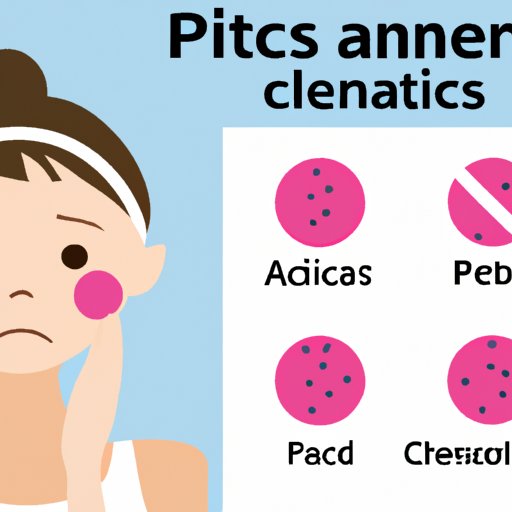Introduction
Cheek acne can be a frustrating condition to deal with. While it is most common among adolescents, adults of all ages can suffer from this condition. Fortunately, there are treatments available that can help manage and clear up the symptoms. But understanding what causes cheek acne is the first step to finding the right treatment for you.
This article will explore what causes cheek acne. We will look at the role of genetics, hormones, diet, stress, skin care products, environmental factors and allergens in causing or worsening cheek acne. By the end of the article, you should have a better understanding of what may be causing your acne and how to best treat it.

Analyzing the Role of Genetics in Cheek Acne
Genetics can play a role in the development of cheek acne. Certain genetic mutations can make individuals more prone to developing acne than those without the mutation. Research has shown that certain genes are linked to an increased risk of developing acne. These genes are involved in the production of sebum, which is an oily substance produced by the sebaceous glands in the skin.
How genetics may affect treatment options also depends on the type of acne. For example, if someone has a genetic mutation that makes them more prone to developing non-inflammatory acne, they may respond better to topical treatments such as retinoids or benzoyl peroxide. On the other hand, if someone has a genetic mutation that makes them more prone to developing inflammatory acne, they may need to use oral medications such as antibiotics or birth control pills.

Exploring the Impact of Hormones on Cheek Acne
Hormones can also play a role in causing or worsening cheek acne. Hormonal imbalances can lead to an increase in sebum production, which can cause clogged pores and result in acne breakouts. This is especially true during times of hormonal changes such as puberty, pregnancy, and menopause.
The link between hormones and acne flare-ups can also be impacted by lifestyle choices. For example, people who smoke and drink alcohol may experience more severe acne breakouts due to the effect these substances have on hormone levels.

Examining the Link Between Diet and Cheek Acne
Diet can also contribute to acne. Certain foods can cause inflammation in the body, which can lead to an increase in acne. Foods high in sugar, dairy, and processed carbohydrates are particularly problematic. Eating a balanced diet that is rich in fruits, vegetables, lean proteins, and healthy fats can help reduce acne flare-ups.
In addition to eating a balanced diet, avoiding overly processed and packaged foods can also help manage acne. These foods often contain preservatives, additives, and other chemicals that can irritate the skin and cause breakouts.

Investigating the Relationship Between Stress and Cheek Acne
Stress can also contribute to acne. When we are stressed, our bodies produce higher levels of cortisol, which can increase oil production and lead to clogged pores. Managing stress through relaxation techniques such as yoga, meditation, or deep breathing can help reduce acne flare-ups.
It is also important to get enough sleep when dealing with acne. Lack of sleep can lead to an increase in stress hormones, which can worsen acne. Aim for seven to nine hours of sleep each night to help keep stress levels low.
Understanding the Role of Skin Care Products in Cheek Acne
Skin care products can also play a role in causing or worsening cheek acne. Certain ingredients in skin care products can irritate the skin and lead to breakouts. To avoid this, look for products labeled “non-comedogenic” or “oil-free”, which means they won’t clog your pores.
It is also important to avoid products that contain fragrances, alcohol, and other harsh ingredients. These ingredients can strip the skin of its natural oils and leave it vulnerable to irritation and breakouts.
Investigating the Role of Environmental Factors in Cheek Acne
Environmental factors can also contribute to acne. Pollution and other toxins in the air can irritate the skin and lead to breakouts. To reduce exposure to environmental toxins, wear protective clothing when outdoors and limit your time in highly polluted areas.
In addition, using a gentle cleanser and avoiding long hot showers can help reduce irritation caused by environmental toxins. Cleansers with moisturizing ingredients such as ceramides or hyaluronic acid can help keep the skin hydrated and prevent breakouts.
Examining the Role of Allergens in Cheek Acne
Allergens can also cause or worsen acne. Common allergens that can trigger acne include pollen, dust mites, pet dander, and mold. If you suspect that an allergen is contributing to your acne, you should consult with an allergist to determine the best course of action.
If you are allergic to a specific allergen, it is important to take steps to reduce your exposure. This may involve changing your cleaning routine, avoiding certain foods, or taking allergy medication. Taking these steps can help reduce your risk of experiencing an allergic reaction and can help improve your overall skin health.
Conclusion
Cheek acne can be a frustrating condition to deal with. Fortunately, understanding what causes it can help you find the right treatment for you. This article explored the role of genetics, hormones, diet, stress, skin care products, environmental factors and allergens in causing or worsening cheek acne. By understanding the potential causes of your acne, you can take steps to reduce your risk of breakouts and achieve clear skin.


